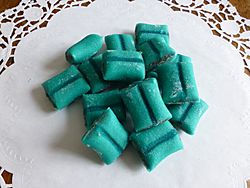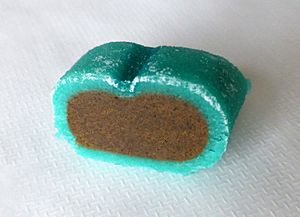Coussin de Lyon facts for kids
 |
|
| Type | Pastry |
|---|---|
| Place of origin | France |
| Region or state | Lyon |
| Main ingredients | Chocolate, marzipan, curaçao liqueur |
The Coussin de Lyon is a special sweet treat from Lyon, France. It's made of delicious chocolate and marzipan. This candy looks like a small cushion. It has a pale green marzipan outside with a dark green stripe. Inside, it's filled with a creamy chocolate ganache that has a hint of curaçao liqueur flavor.
Contents
History of the Coussin de Lyon
How the Sweet Treat Was Created
The Coussin de Lyon has an interesting story. In 1643, a serious illness spread through the city of Lyon. The city leaders, called aldermen, made a promise. They vowed to hold a special parade to Fourvière to ask the Virgin Mary to protect their city.
During this parade, they carried a large wax candle and a gold crown. These items were placed on a soft silk cushion. This event gave a chocolatier named Voisin a great idea. The Voisin company has been in Lyon since 1897. In 1960, they decided to create a candy shaped like that silk cushion.
A Popular French Sweet
This new sweet treat quickly became very popular. It is now one of the most famous French candies that contains chocolate ganache. You can buy these "cushions" one by one. They are also sold in fancy velvet boxes. These boxes remind people of the original silk cushion from the parade.
Making and Selling the Coussin
Who Makes the Coussin de Lyon?
The Boucaud family, who own the Voisin company, are the main makers of the Coussin de Lyon. They have special permission to sell these candies. They make them in their own stores across the Rhône-Alpes region and in Marseille.
How Many Are Made?
Paul Boucaud, who manages the Voisin company, shared some interesting facts. He said that the company makes about 85 tons of Coussin de Lyon candies every year! That's a lot of sweet treats. He also mentioned that they make 10% more each year because they are so popular. The Boucaud family prefers to sell their candies directly in their own shops. They do not use big supermarkets or other large stores to sell their product.
See also
 In Spanish: Coussin de Lyon para niños
In Spanish: Coussin de Lyon para niños
 | Leon Lynch |
 | Milton P. Webster |
 | Ferdinand Smith |


